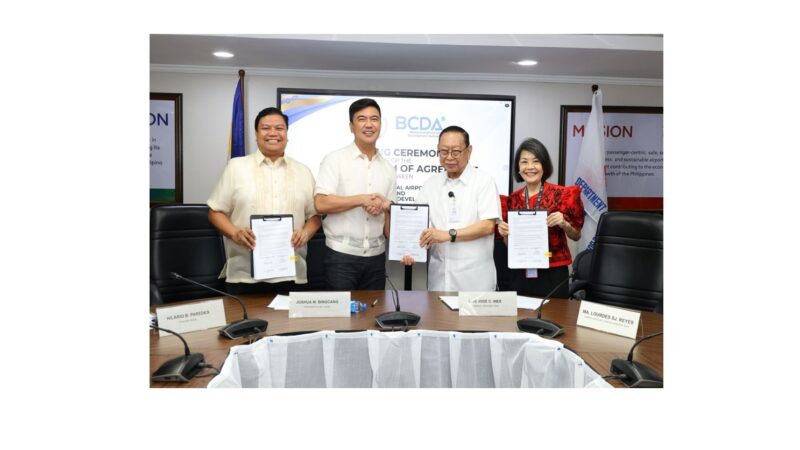Ayala supports global call to align sustainability disclosures

MANILA — Ayala Corporation joins 63 companies, investor groups, and professional accounting firms around the world in endorsing a joint statement that calls for a global baseline for reporting sustainability-related information.
Developed jointly by the World Business Council for Sustainable Development (WBCSD), the Principles for Responsible Investment (PRI), and the International Federation of Accountants (IFAC), this call to action seeks to provide a comprehensive global baseline of sustainability disclosures needed by capital markets, including investors who allocate capital internationally, companies who operate and raise capital across national borders, and the accounting profession that serves all consumers of corporate reporting.
“At Ayala, we have always adhered to the highest level of transparency. Hence, we express our strong support to the call for a globally compatible set of sustainability reporting standards as well as a coordination mechanism that allows stakeholders to understand the value these standards bring in driving growth for the greater good,” said Albert de Larrazabal, Ayala Corporation’s Chief Finance Officer, Chief Risk Officer, and Chief Sustainability Officer.
Ayala Corporation is the first and only WBCSD member-conglomerate in the Philippines. Ayala and its core business units are signatories to the Taskforce on Climate-related Financial Disclosures and are currently working to implement the 11 recommended disclosures in the pillars of governance, strategy, risk management, and metrics & targets. ###
Leading Financial Market Participants Call for Stronger Alignment of Regulatory and Standard Setting Efforts around Sustainability Disclosure
Investors, companies, and the accountancy profession all benefit from simplicity and alignment, serving the public interest
Clear, comprehensive, and comparable disclosure of sustainability-related information is one of the foundational building blocks of a well-functioning global financial system. Financial market regulators should seize this historical and fast-closing window of opportunity to get it right by ensuring compatible standards.
Significant efforts by the International Sustainability Standards Board (ISSB), the US Securities and Exchange Commission (SEC), and the European Commission together with the European Financial Reporting Advisory Group (EFRAG), all aim to address the need to enhance and evolve corporate reporting to include and consider sustainability information.
As financial market participants representing over 200 companies, 4,902 investors with the US $121.3 trillion in assets under management, and more than 3 million professional accountants – WBCSD (World Business Council for Sustainable Development), PRI (Principles for Responsible Investment), and IFAC (International Federation of Accountants) collectively welcome and support these efforts. However, current draft standards and initiatives are not technically compatible in terms of concepts, terminologies, and metrics.
As these proposed sustainability-related disclosure requirements are refined and finalized, we call for each initiative to pointedly avoid regulatory and standard setting fragmentation by aligning key concepts, terminologies, and metrics on which disclosure requirements are built.
A coordinated approach is needed to provide the comprehensive global baseline of sustainability disclosures needed by capital markets. Collaboration and coordination are also important between sustainability disclosure initiatives and financial accounting standard-setting.
A globally consistent, comparable, reliable, and assurable corporate reporting system is indispensable in providing all stakeholders with a clear and accurate picture of an organization’s ability to create sustainable value over time.
Interoperability—allowing companies to collect and report in a manner that effectively serves both local and global requirements— helps meet the needs of global capital markets, including investors who allocate capital internationally, companies who operate and raise capital across national borders, and the accounting profession that serves all consumers of corporate reporting.
For reporting entities, a global baseline for capital markets will help reduce cost, complexity, and confusion — increasing the utility, and comparability of the information, while serving the fundamental purpose of sustainability reporting, which includes delivering more sustainable outcomes.
For investors who allocate capital based on comparable financial and sustainability-related information, global consistency is a matter of investor protection, growing market demand, and the ability to incorporate ESG issues into investment decisions that contribute to sustainable outcomes.
For professional accountants, charged with transforming disclosure requirements into high-quality and decision-useful information, global consistency and alignment provide the best foundation for high-quality sustainability-related reporting and its assurance.
Together, we welcome the establishment by the International Sustainability Standards Board of a working group to enhance compatibility between the global baseline and jurisdictional initiatives through a coordination mechanism. We strongly urge all involved policymakers to engage with this platform at this current historical juncture and strive toward delivering the level of alignment needed by financial markets at the global level.
As global organizations committed to contributing to a global financial system that delivers sustainable and long-term value creation, we look forward to supporting this process.
This statement is endorsed by:
Achmea Investment Management, ADM, Arçelik Global, Assicurazioni Generali, Ayala Corporation, Baloise Asset Management, BCSD Taiwan X Taiwan Sustainable Finance Platform, BDO, Beach Point, Capital Management, Borealis Group, Boston Trust Walden, Brunel Pension Partnership, Bühler Group, Calvert Research and Management, CentraRSE, Dalton Investments, Dana Investment Advisors, DBS Group, de Pury Pictet Terrettini, Deloitte, Desjardins Global Asset Management, DNV, East Capital Group, Ecofi, EFG Asset Management, EmergeVest, ENI S.p.A., Equitile Investments, Ernst & Young, Global Limited, Etica Funds – Responsible Investments, Future Super, GAM Investments, Grant Thornton, International, Ltd., Hewlett Packard Enterprise, HÖ Sabanci Holding, Holcim Ltd, Honda Motor Co., Ltd., Investment Management Corporation of Ontario, Kieger, KPMG International, Lyrical Asset Management, Mercedes-Benz Group AG, Nestlé, Newton Investment Management, Northern Ireland Local Government Officers’ Supperannuation Committeee, Octagon Credit Investors, Öhman Fonder, Olam Food Ingredients, Pegaso Pension Fund, Perennial Investment Management, PKA, PwC, Rathbones Group, Resona Asset Management, Responsible Investment Association Australia, Royal DSM, SABIC, SCG, Shell plc, STAR Capital Partnership, Swisscanto by Zürcher Kantonalbank, Tareno AG, Webster Equity Partners and Wespath Benefits and Investments. ###







